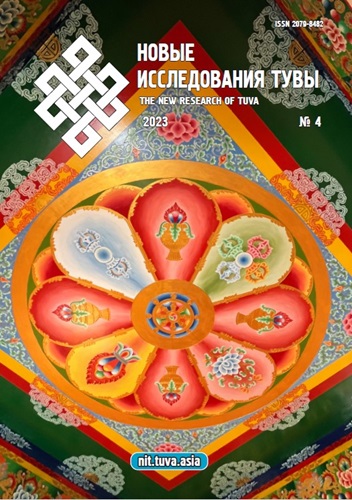Roman Senchin: The poetics of Tuvan text
DOI:
https://doi.org/10.25178/nit.2023.4.1Keywords:
local text; Tuvan text; metatext; image of paradise lost; realm of memory; Roman SenchinAbstract
The article examines the controversial issues of identifying the local text as a research category. The authors make an attempt to describe the Tuvan local text using the case of prosaic works by the contemporary writer Roman Senchin. The features of the Tuvan text are correlated with modern theories of local texts and the category of metatext. The formal and substantive aspects of the Tuvan text are outlined. In the course of the analysis of the author’s model of the Tuvan text — as a sign of Senchin’s metaconsciousness — we have determined the principles of textual representation of the levels of the artistic and existential matrix of genius loci compared with the metaimage of the paradise lost. It is noted that the matrix of the Tuvan text includes the image of the “hero of the way” who perceives the space of the “alien Tuva” as a discovered “own world”.
The analytics of the article is fit in with the system of interdisciplinary paradigmatic connections of aesthetics, historiosophy, ethnography and mythology. It is concluded that understanding of the foreign ethnic and cultural component of Russian literature about Tuva as a historical and cultural phenomenon makes it possible to find manifestations of the Tuvan text in completely diverse authorial artistic systems.
References
Antsiferov, N. P. (2009) Problemy urbanizma v russkoi khudozhestvennoi literature. Opyt postroeniia obraza goroda — Peterburga Dostoevskogo — na osnove analiza literaturnykh traditsii [Issues of urbanism in Russian fiction. An experience of building the image of the city — Dostoevsky’s St. Petersburg — based on the analysis of literary traditions] / comp., prep. and afterword by D. S. Moskovskaia. Moscow, IMLI RAS. 584 p. (In Russ.).
Bakhtikireeva, U. M. (2009) Tvorcheskaia bilingval'naia lichnost' (osobennosti russkogo teksta avtora tiurkskogo proiskhozhdeniia) [Creative bilingual personality (authors of Turkic origin and their texts in Russian)]. Astana, TsBOiMI Publ. 259 p. (In Russ.).
Bashmakoff, N. (2006) Lokal'nyi tekst, golos pamiati i poetika prostranstva [Local text, the voice of memory and the poetics of space]. In: Istoriia i povestvovanie [History and narration] : A collection of articles / ed. by G. V. Obatnin and P. Pesonen. Moscow, Novoe literaturnoe obozrenie. 596 p. Pp. 576–591. (In Russ.).
Bayanbayeva, Zh. A. (2016) Lokal'nyi tekst i ego funktsii (na primere Alma-Atinskogo lokal'nogo teksta) [To the question of the local text and its functions (on the example of the Almaty local text)]. RUDN Journal of Studies in Literature and Journalism, no. 2, pp. 77–84. (In Russ.).
Gavrilina, L. M. (2018) Lokal'nye sverkhteksty kak forma osmysleniia regional'nogo mnogoobraziia rossiiskoi kul'tury [Local supertexts as a form of reflection of regional diversity of Russian culture]. Vestnik Moskovskogo gosudarstvennogo instituta kul'tury, no. 2 (82), pp. 43–50. (In Russ.).
Garipova, G. T. (2018) Kalendar' Moskvy: «Sobranie utonchennykh» i prostranstvo Londona v metasoznanii Khamida Ismailova [Moscow calendar: “Assembly of the Refined” and the space of London in Khamid Ismailov’s metaconsciousness]. In: Genius loci v literature, iskusstve, kul'ture [Genius loci in literature, art, culture] : A collection of research articles / comp. and ed. by E. F. Shafranskaya. St. Petersburg, Svoe izdatel'stvo. 240 p. Pp. 71–85. (In Russ.).
Garipova, G. T. (2022) Onomasticheskaia transkul'tural'nost' v romane Khamida Ismailova «Mbobo» [Onomastic transculturality in Khamid Ismailov’s novel “Mbobo”]. Philological Sciences. Scientific Essays of Higher Education, no. S6, pp. 100–108. (In Russ.). DOI: https://doi.org/10.20339/PhS.6s-22.100
Zamiatin, D. I. (2013) Genii i mesto: uskol'zaiushchaia so-v-mestnost' [Genius and place: The elusive co-locality]. Obshchestvennye nauki i sovremennost', no. 5, pp. 154–165. (In Russ.).
Ilyin, I. P. (2004) Metarasskaz [Metastory]. In: Zapadnoe literaturovedenie XX veka [Western literary studies of the 20th century] : Encyclopedia / editor-in-chief: E. A. Tsurganova. Moscow, Intrada. 560 p. Pp. 251–253. (In Russ.).
Kenin-Lopsan, M. B. (2006) Traditsionnaia kul'tura tuvintsev [Traditional culture of the Tuvans] : A study guide / transl. from Tuvan. Kyzyl : Tuvan Book Publishing House. 230 p. (In Russ.).
Lamazhaa, Ch. K. (2013) Tuva 1990-kh glazami poreformennogo pokoleniia [Tuva of 1990s through the eyes of new generation]. The New Research of Tuva, no. 2, pp. 157–160. (In Russ.).
Mironenko, E. A. (2012) Fol'klorno-mifologicheskii kontekst povesti Chingiza Aitmatova «Belyi parokhod» [Folklore and mythological context of the story by Chingiz Aitmatov “White Ship”]. Vestnik Kazanskogo gosudarstvennogo universiteta kul'tury i iskusstv, no. 3–2, pp. 115–118. (In Russ.).
Nalimov, V. V. and Drogalina, Zh. A. (1984) Veroiatnostnaia model' bessoznatel'nogo. Bessoznatel'noe kak proiavlenie semanticheskoi vselennoi [Probabilistic model of the unconscious. The unconscious as a manifestation of the semantic universe]. Psikhologicheskii zhurnal, vol. 5, no. 6, pp. 111–122. (In Russ.).
Nichiporov, I. B. (2019) Iz Kyzyla v Parizh: geopoetika sovremennogo psikhologicheskogo romana («Dozhd' v Parizhe» R. Senchina) [From Kyzyl to Paris: The geopoetics of the modern psychological novel (“Rain in Paris” by R. Senchin)]. RUDN Journal of Studies in Literature and Journalism, vol. 24, no. 4, pp. 616–624. (In Russ.). DOI: https://doi.org/10.22363/2312-9220-2019-24-4-616-624
Prihodchenko, I. O. (2023) Lokal'nyi tekst provintsial'noi literatury: k voprosu ob opredelenii poniatiia i istorii izucheniia [Local text of provincial literature: The question of the concept definition and the history of study]. Russian Journal of Social Sciences and Humanities, vol. 17, no. 1, pp. 30–42. (In Russ.). DOI: https://doi.org/10.57015/issn1998-5320.2023.17.1.3
Skorospelova, E. B. (2003) Russkaia proza XX veka: ot A. Belogo («Peterburg») do B. Pasternaka («Doktor Zhivago») [Russian prose of the 20th century: From A. Bely (“Petersburg”) to B. Pasternak (“Doctor Zhivago”)]. Moscow, TEIS. 420 p. (In Russ.).
Sorochan, A. Yu. (2010) Tverskoi krai v literature: obraz regiona i regional'nye obrazy [Tver region in literature: The image of the region and regional images]. Tver, M. Batasova’s Publ. 172 p. (In Russ.).
Suprun, V. I. (2019) Lokal'nyi kazachii tekst v iazyke i literature: ot F. D. Kriukova do B. P. Ekimova [Local Cossack text in language and literature: From F. D. Kryukov to B. P. Ekimov]. In: Vostok — Zapad: prostranstvo lokal'nogo teksta v literature i fol'klore [East — West: The space of local text in literature and folklore] : Festschrift dedicated to the 70th anniversary of A. Kh. Goldenberg / ed. by N. E. Tropkin. Volgograd, Peremena. 471 p. Pp. 193–204. (In Russ.).
Toporov, V. N. (1995) Peterburg i «Peterburgskii tekst russkoi literatury» (Vvedenie v temu) [Petersburg and the “Petersburg text of Russian literature” (Introduction to the topic)]. In: Toporov, V. N. Mif. Ritual. Simvol. Obraz : Issledovaniia v oblasti mifopoeticheskogo : Izbrannoe [Myth. Ritual. Symbol. Image : Research in the field of mythopoetic : Selected works]. Moscow, Progress ; Kul'tura. 624 p. Pp. 259–367. (In Russ.).
Toporov, V. N. (2009) Peterburgskii tekst [St. Petersburg text]. Moscow, Nauka. 820 p. (In Russ.).
Kharitonova, V. I. (2018) Tuvinskii (neo)shamanizm kak kul'tovaia i tselitel'skaia praktika v sovremennom mire [Tuvan (neo)shamanism as a religious and healing practice in contemporary world]. The New Research of Tuva, no. 4, pp. 47–76. (In Russ.). DOI: https://doi.org/10.25178/nit.2018.4.3
Shafranskaya, E. F. (2010) Tashkentskii tekst v russkoi kul'ture [Tashkent text in Russian culture]. Moscow, Art Khaus media. 301, [1] p. (In Russ.).
Shafranskaya, E. F. (2016) Turkestanskii tekst v russkoi kul'ture: Kolonial'naia proza Nikolaia Karazina (istoriko-literaturnyi i kul'turno-etnograficheskii kommentarii) [Turkestan text in Russian culture: The colonial prose of Nikolay Karamzin (historical, literary, cultural and ethnographic commentary)]. St. Petersburg, Svoe izdatel'stvo. 370 p. (In Russ.).
Shafranskaya, E. F. (2017) Vruny i fantazery kak pattern lokal'nykh tekstov XX v. [Liars and fantasizers as a pattern of the XX century local texts]. MCU Journal of Philology. Theory of Linguistics. Linguistic Education, no. 1 (25), pp. 22–29. (In Russ.).
Shafranskaya, E. F. and Garipova, G. T. (2022) Lokal'nye teksty v russkoi literature [Local texts in Russian literature] : A study guide. Moscow, Urait. 109 p. (In Russ.).
Shafranskaya, E. F. and Garipova, G. T. (2023) Tuvinskii tekst v aspekte transkul'turatsii [The Tuvan text in the aspect of transculturation]. Polylinguality & Transcultural Practices, vol. 20, no. 3, pp. 497–514. (In Russ.). DOI: https://doi.org/10.22363/2618-897X-2023-20-3-497-514
Shafranskaya, E. F. and Garipova, G. T. and Smirnova, A. I. (2022) Metafory ostanovivshegosia vremeni v sovremennoi literature [Metaphors of stopping time in modern literature]. Philological Sciences. Scientific Essays of Higher Education, no. 4, pp. 132–142. (In Russ.). DOI: https://doi.org/10.20339/PhS.4-22.132
Welsch, W. (1995) Transkulturalitat. In: Migration und kultureller Wandel. Stuttgart, Institut für Auslandsbeziehungen. 152 S. S. 1015–1020. (Zeitschrift für Kultur-Austausch, Jg. 45, Vj. 1).
Published
How to Cite
For citation:
Shafranskaya E. F., Garipova G. T. and Tokareva N. A. Roman Senchin: poetika tuvinskogo teksta [Roman Senchin: The poetics of Tuvan text]. New Research of Tuva, 2023, no. 4, pp. 6-21.DOI: https://doi.org/10.25178/nit.2023.4.1
Issue
Section

This work is licensed under a Creative Commons Attribution-NonCommercial 4.0 International License.

Author(s) license holder(s) grant rights for their work to the journal (grantee of a license) under the simple non-exclusive open license in accordance with Art. 1286.1 «Open license for a research work, work of literature or fine arts», Civil Code of the Russian Federation.
New Research of Tuva publishes articles under the Creative Commons Attribution-NonCommercial license (CC BY-NC).
Since it is an open license, author(s) reserve the right to upload the article to their institutional repository, submit it to another journal (if it allows republications), or republish it on their own website (in full, or in part).
However, several conditions apply here:
a) The republished version must always contain the name(s) and affiliation(s) of the author(s), the original title and the hyperlink to the original version on the New Research of Tuva website;
b) It must be in open access, free of charge, and no category of readers must be in any way whatsoever advantaged over general readership.
c) should the contribution be submitted elsewhere by its author(s) without substantial modification (30% or more of original text unchanged), the body of the article should contain a disclaimer that the original version was published in New Research of Tuva (with a link to the respective page)
The CC-BY-NC is a non-revocable license which applies worldwide and lasts for the duration of the work’s copyright.











